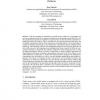Free Online Productivity Tools
i2Speak
i2Symbol
i2OCR
iTex2Img
iWeb2Print
iWeb2Shot
i2Type
iPdf2Split
iPdf2Merge
i2Bopomofo
i2Arabic
i2Style
i2Image
i2PDF
iLatex2Rtf
Sci2ools
130
click to vote
JUCS
2010
2010
Performance Optimizations for DAA Signatures on Java enabled Platforms
: With the spreading of embedded and mobile devices, public-key cryptography has become an important feature for securing communication and protecting personal data. However, the computational requirements of public-key cryptosystems are often beyond the constraints embedded processors are bound to. This is especially true for cryptosystems that make heavy use of modular exponentiation like the Direct Anonymous Attestation scheme. The most popular algorithm for modular exponentiation is the Montgomery exponentiation based on sliding window technology. This technology offers several configuration options in order to get the best trade-off between the amount of precomputations and multiplications that are required for different exponentiation operands. Consequently, the optimum configuration and best parameters for receiving the highest performance gain are of interest. In this paper, we analyse different approaches for improving the performance of modular exponentiations with respect ...
Related Content
| Added | 29 Jan 2011 |
| Updated | 29 Jan 2011 |
| Type | Journal |
| Year | 2010 |
| Where | JUCS |
| Authors | Kurt Dietrich, Franz Röck |
Comments (0)

